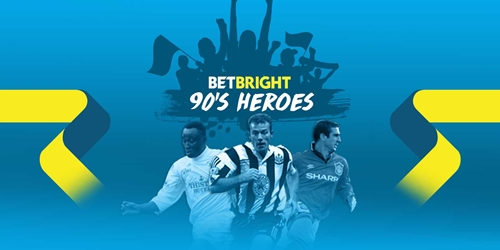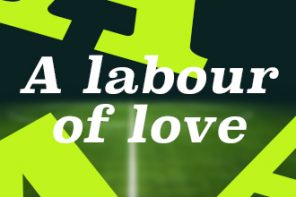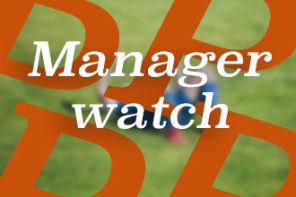’90s Heroes is a new series by Adam Hurrey on the Bet Bright football blog which looks back on the legends of the game in what now seems a simpler time for football.
You only need to look as far as the first paragraph of his Wikipedia page to get the measure of the man.
David Désiré Marc Ginola…is a French former international football player who has also worked as an actor, model and football pundit.
Just 22 words needed to illustrate that 1) David Ginola has an exceptional middle name and 2) that he has attempted no fewer than three careers based almost entirely on being told how awesome you are. Plus the football punditry.
Brest Armorique 1990-91 : David GINOLA loved boats pic.twitter.com/1tMuU4FKvn
— Old School Panini (@OldSchoolPanini) February 25, 2016
This series has recalled the busy Premier League summer of 1995 more than once, and Ginola’s £2.5m move from Paris Saint-Germain to Newcastle had neither the profile nor the fanfare of Dennis Bergkamp striding into Arsenal or Juninho’s Middlesbrough unveiling. What it constituted to the man himself, though, was a fresh start, perhaps even an escape, after the extraordinary fall-out (in every sense) from France’s failure to qualify for the 1994 World Cup.
An overhit cross at the Parc des Princes, when France were clinging on to the draw they needed against Bulgaria to book their place in the USA, eventually led to Emil Kostadinov’s winner just a second before the clock hit ninety minutes. The Bulgarians looked forward to a head-turning USA ‘94 campaign, while the French manager Gerard Houllier swiftly trained his sights on his scapegoat.
“[Ginola] sent an Exocet missile through the heart of French football and committed a crime against the team.”
There was only one Premier League destination, then, for a thrilling, crowd-pleasing, emotionally volatile winger with a penchant for the anti-climax. Despite reported interest from Barcelona, Ginola upped sticks for Kevin Keegan’s perpetual optimism and St James’ Park.
Newcastle defender Steve Howey’s first impressions of the Frenchman were straight out of the “wide-eyed English teammate” textbook. Cue slightly too-good-to-be-true mid-90s training-ground anecdote:
“Everyone knew straight away how good he was,” Howey told Sky Sports. “Every time a new signing came in, we’d have a five-a-side and we’d find out very, very quickly if they were up to it. We used to absolutely whack the ball into them just to see if they could cope with it.
“So about four or five balls have gone up to David and he’s absolutely killed it stone dead, twisted and turned and stuck it in the bottom corner. Scott Sellars, who was at the club at the time, turned around to one of the lads and said: ‘That’s me out of the team.'”
Indeed now obsolete, Sellars was dispatched to Bolton before Christmas, by which time Ginola had emphatically made his mark. Dropped shoulders and curled finishes, rampaging runs at terrified full-backs and arrowed drives into the top corner helped propel Newcastle to a seven-point lead with a game in hand at the turn of the year and inspire some vintage Martin Tylerisms along the way:
Not that it was all as plain sailing as his earlier days in those pants on the Brittany coast. An elbow to the head of frequent nemesis Lee Dixon earned a fuming Ginola a red card in a League Cup quarter-final against Arsenal and a harsh lesson in the more infuriating aspects of the English game.
Ginola stormed down the Highbury tunnel, reportedly slapping the wall with anger: “They just won’t let me play football!” Soon after that, those frustrations extended to the entire Newcastle side as Manchester United’s relentless form reeled them in and condemned them to a legacy as poster-boys for the faltering title challenge.
Back Newcastle came the following season, this time with a £15m Alan Shearer in their armoury. While they would find a 28-goal return on that investment, Ginola further enhanced his reputation as a scorer of great goals rather than a great goalscorer, to an almost absurd degree. He scored just twice in 1996/97 and they were arguably worth ten times as many; within the space of five October days, Ginola had produced his best (and final) two moments in a black-and-white shirt.
The first of those eased open the floodgates in perhaps the definitive thrashing in Premier League history, only to be later overshadowed by Philippe Albert taking a single, 83rd-minute cherry and chipping it on to the icing of a Newcastle-5-Manchester-United-
Ginola was perhaps fortunate to still be in possession of two functioning lower limbs by the time Albert had applied his garnish, such was the absolute fury with which Gary Neville launched into the sort of tackle that only a 0-4 scoreline could inspire. Newcastle’s No.14 sidestepped it like a small dog turd.
So, legs still attached, Ginola next faced the rather less fired-up prospect of Ferencvaros in the UEFA Cup. Faustino Asprilla had already eliminated the one-goal deficit from the first leg before the Hungarian goalkeeper clawed haplessly at a corner. Ginola loitered on the edge of the area to find the ball bouncing invitingly towards him.
One touch with the thigh. Still not quite set for the volley. In his face arrives young substitute Richard Hollo – a man Google deems not to exist, quite appropriately – and he is dealt with by the unfussiest of over-the-head lobs. With the dropping ball now truly under Ginola’s spell, albeit on his nominally weaker left foot, the finest goal of his career is seriously on:
Such highs inevitably gave way to the lows. Keegan departed, shattered after another spectacular failure, and his replacement Kenny Dalglish didn’t fit Ginola’s narrow parameters as an accommodating manager.
“You could talk to Keegan. I have no desire to talk to Kenny Dalglish. I didn’t come to Newcastle to play for him. I signed for one man: Keegan. He is gone and now I am an orphan.”
Despite that outburst, Ginola ruled out a return to Paris Saint-Germain and simultaneously managed to predate Fred the maître d’ from First Dates by the best part of 20 years:
“When you have a passionate affair with a woman and then you leave her, you can never start the same love story all over again.”
Quite. So, Ginola urgently needed another club with another set of demanding fans and another penchant for shooting themselves in the foot at least once a season – once again, there was only one option. £2.5m, the very same fee that had prised him away from Paris, was enough for Alan Sugar to secure Ginola for a Tottenham side labouring at the mullet-end of Gerry Francis’ reign as manager. Francis would be the first of no fewer than five managers – “permanent” or otherwise – that Ginola would have to impress, but the 30-year-old clearly fancied his chances from the start.
Classic Transfer – David Ginola signs for Spurs '97 pic.twitter.com/dSVnsLQk45
— CFS (@classicshirts) August 4, 2016
Having hit double figures in both of his last two seasons in France, more in the way of net-bulging was justifiably expected of Ginola in the Premier League. In the end, an average of barely three league goals a season for Newcastle and Spurs turned out to be a losing battle of quantity versus quality.
Having bubbled away nicely for 13 seasons, Ginola’s career was about to reach two-footed fruition at White Hart Lane. For three years, he was at the centre of almost everything good about Tottenham which, once you strip away the Christian Grosses and the Paolo Tramezzanis, admittedly doesn’t leave very much.
Ginola's done well there. (BBC) pic.twitter.com/iFbz8jRKrQ
— Huw Davies (@thehuwdavies) September 9, 2016
By February of 1999, Spurs were under the unmistakable control of the pragmatist’s pragmatist George Graham – “too many people talk about flair, but it’s all such nonsense” – and he did not mince his words with the Independent when it came to his newly-inherited French enigma.
“In training, as soon as he started, head down, beating legs, I’d stop everything and say, ‘David, oh, no, no, no’. Simplicity is genius. I said to him, ‘David, I want an end product to your play. You’ve got too much talent to be an entertainer. If I want to watch tricks, I’ll go to a circus’. Some of his crossing this season has been magnificent. But he’s got to score more goals.”
That interview – presumably soon torn out and stuck to the door of Ginola’s locker – was followed just three days later by an FA Cup fifth-round replay at home to Leeds (from whom Graham had recently defected) into which Ginola went with just two goals in thirty games. Not for the first time, he had a point to prove. And, not for the first time, he took an almost comically circuitous route to doing so.
His first attempt at satisfying his permanently dissatisfied manager plots a course roughly 90 degrees to the goal, which doesn’t bode well. Picking up the ball on the right-hand edge of the penalty area, Ginola arcs his way to the opposite side of the pitch – Kewell, Hopkin, Haaland, Halle, Woodgate all outmanoeuvred one by one – leaving a flash of silver-tinted, L’Oréal-sponsored hair trailing behind him throughout. Having gone to great and understandable lengths not to pass to Steffen Iversen, Ginola finally has the chance to let fly on his left foot…oh, here’s Clive Tyldesley:
Having been denied an utterly unrecreatable goal by the fingertips of Nigel Martyn and the curvature of the far post, this genius could at least enjoy the fact that he’d hoodwinked Graham into his most embarrassing dugout moment since he hit his head on the substitutes’ bench against Ginola’s PSG side in 1994.
With the deadlock finally broken by Darren Anderton larruping one in from 35 yards (our man with the assist, obviously), it was then time for Ginola to try his luck once more…only to be denied by the crossbar. Third time lucky? Absolutely. Just as against Ferencvaros, the ball begged Ginola to belt it home, and he finally obliged.
This was now undeniably (certainly in hindsight, anyway) peak David Ginola. The quarter-final draw took Spurs to Oakwell to face second-tier Barnsley – not an intimidating trip, but certainly plum in the middle of the “tricky” category. Just as against Leeds, Ginola had to wait 68 minutes for his moment.
Right-back Nicky Eaden? Comprehensively and efficiently sidestepped. The forward’s challenge from the No.9? Briefly life-threatening but ridden smoothly enough. Sean Dyche’s twin brother hoping that an obscure Law of the Game decrees that simply touching Ginola’s untucked shirt might be enough to abandon the game? No. Finally, a man who dental records later identified as Arjan De Zeeuw is beaten by yet another dropped Ginola shoulder and the rest is FA Cup history.
There is something particularly pleasing about players who reach an early-30s peak of their powers, when everything just seems to come so much more naturally to them than in their frantic youth, when all that experience finally clicks into place to ensure a Matrix-style understanding of the football happening around them.
A combination of being so deeply in the zone (at the approximate moment the voting papers were sent out), and nobody being able to choose between the main protagonists of Manchester United’s treble-bound team, meant that a 32-year-old Ginola took both the PFA and Football Writers’ player of the year awards.
Plenty of players have done that double, of course, but only Teddy Sheringham and Kenny Dalglish have equalled Ginola by doing so in their thirties. His suitably individual achievement proved to be more than his collective haul of silverware in England – he won the League Cup final that year, before which the opposing manager Martin O’Neill had almost waved the white flag at the prospect of Tottenham’s talisman:
“He is playing on such a wave of confidence he knows that even if he loses the ball four or five times on the trot, the fans will forgive him.”
True as that may have been, George Graham was a tougher nut to keep cracked and Ginola was eventually ushered out of the door at White Hart Lane. Brief spells beckoned at two of the most traditional places Premier League careers go to die. At Aston Villa, there was only an entertaining post-goal disrobing to enjoy, after manager John Gregory had introduced the fat-shaming euphemism of “a bit of timber” to the footballing consciousness and given Ginola one final doubter to silence.
David Ginola in an Everton shirt – much like Paul Gascoigne in an Everton shirt – sounds a bit wrong, and it was. A final, 12-minute farewell in May 2002 – carrying all the timber in Merseyside down to Arsenal’s title-winning party while being gleefully booed by those at Highbury who could still recognise him – wasn’t quite the denouement Ginola deserved, but there we are.
Post-retirement – without a Houllier, Graham or Gregory on his case – Ginola has succeeded only in becoming more sickeningly handsome, a process slowed neither by gimmicky bids for FIFA presidency or an emergency quadruple heart bypass, but his Premier League legacy remains unchanged. During those untouchable days in 1999, the Independent’s Greg Wood captured David Ginola’s footballing zenith best of all:
“Ginola is quite probably the luckiest man alive. He not only looks like a god, he plays football like one too (although, to be fair to the gods, the gospels do not mention Jesus Christ being booked for persistent diving during the big Jerusalem derby).”
For the next instalment of ’90s Heroes, check out the Bet Bright football blog on Friday.







